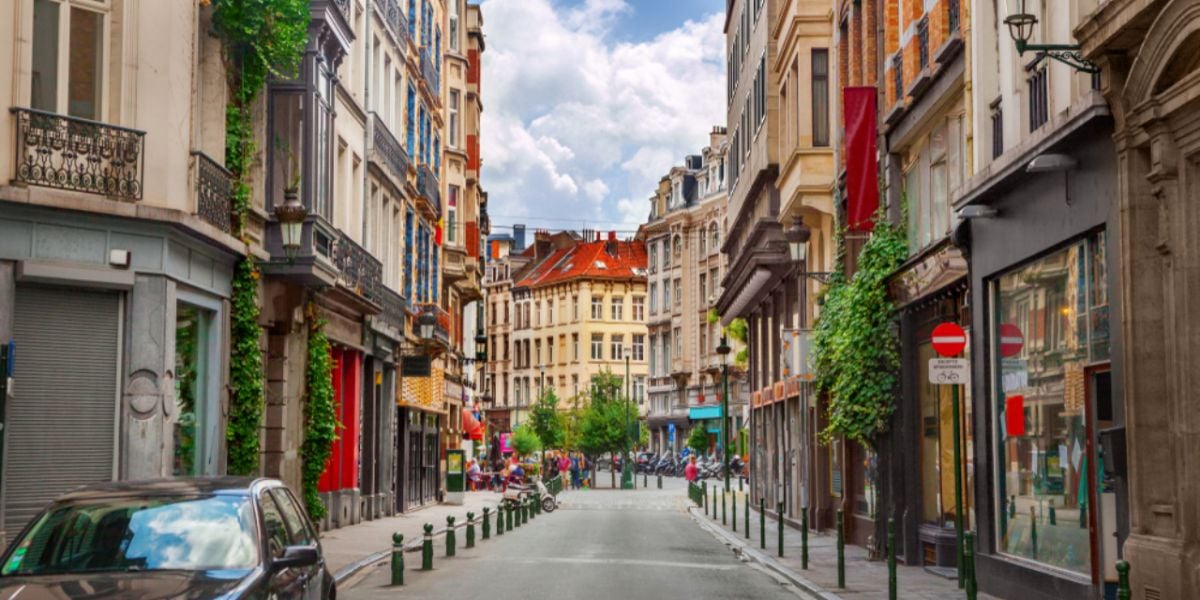
Brussels, a multicultural city and the seat of major European institutions such as the EU or NATO, offers a stimulating and diverse professional environment. However, the market is very competitive and often requires proficiency in several languages (French, English, Dutch). For non-Europeans, specific procedures are necessary before arrival. Here's a comprehensive overview to effectively navigate the Brussels work world.
Overview of the job market in Brussels
Brussels is home to a high concentration of international institutions, NGOs, multinational companies, and sectors such as finance, healthcare, sciences, commerce, and ICT.
There are many positions in Brussels that are very well paid, but the downside is that there is a lot of competition for these roles. Depending on the sector you are targeting, you may need an excellent level of English, French, and Dutch to be invited for an interview. For other jobs, you might get by with just English and another language if the role is more internationally oriented. Non-European nationals may find it harder to find a job in Brussels due to the bureaucratic rules and regulations that local companies must adhere to when recruiting a foreign employee to the EU/EEA.
Besides the European institutions (which are the largest employers in the city), Brussels also has a significant services sector. This means there are many job opportunities in finance, business, healthcare, and social services. Beyond that, there is also a real demand for engineers, technicians, administrative staff, IT professionals, and sales representatives.
This environment generates a high demand for diverse skills, with an employment rate for 20-64-year-olds reaching 72.6% in the first quarter of 2025.
Unemployment in Brussels
Despite a dynamic job market, unemployment is rising: it was at 14.2% in Brussels in the first quarter of 2025, compared to 12.3% at the end of 2024. Youth unemployment (ages 15-24) remains high at 16.6%, while 72.6% of 20-64-year-olds are employed.
How to find a Job in Brussels
Employment assistance organizations
There are many organizations in Brussels that can help you find a job.
The main structures to support you are:
Actiris
Actiris, also known as the Brussels Regional Employment Office, helps job seekers find work in Brussels. It organizes CV writing workshops, assists individuals in writing cover letters, and teaches them how to apply for vacancies. It can also connect you with employers, who list their contact details for free in the Actiris database. As you can see, Actiris offers highly personalized services, so you can feel confident facing the job market.
Primarily, their website is in French, but it is also accessible in Dutch and even in English. In addition, Actiris offers brochures and videos in 22 different languages, and if you need in-person help, they suggest bringing an interpreter to facilitate the process.
SIEP
The SIEP, or Information Service on Studies & Professions, has many useful resources and offers career guidance for job seekers. There are eight centers around Brussels.
You can either make an appointment or simply walk in to receive advice. They are open year-round, even during school holidays. Even better: their services are free and anonymous. Their staff members help people from all backgrounds with personalized services to ensure the best chances in the tough job market.
SIEP not only offers career advice but also assists with education, socio-professional integration, social protection, family and emotional life, political rights, and social organization. The SIEP website is in French.
Werkwinkel Brussels
Werkwinkel Brussels is a non-profit organization with three centers. You can approach them for career orientation services and use their offices. These are intended for Dutch speakers or those wishing to learn the language.
The Werkwinkel Brussel website is only available in Dutch. However, you can use the translation function to easily read things in French. And if you have questions, you can always call or email them to schedule an appointment. You can also send your questions through the website. Although in-person meetings are available, Werkwinkel Brussel will also schedule Zoom and Skype meetings if necessary.
Bruxelles Formation
For French speakers, Bruxelles Formation is also a useful organization to turn to. Its mission is to prepare you for professional life, and to this end, it organizes many useful workshops.
On the Bruxelles Formation site, you have access to over 600 training courses in various sectors, even without a diploma, for job seekers or workers wishing to retrain.
If you are not yet sure which career path to take, head to the information sessions or the City of Trades, where advisors can introduce you to professions that are hiring in fields like HORECA, logistics, IT, management, healthcare, or construction. You can then search for specific programs or certifications via the online catalog.
VDAB
The VDAB is the Flemish equivalent of Actiris. The organization organizes similar training sessions, all aimed at helping job seekers find work and plan their careers.
What's great about the VDAB is that it doesn't just offer in-person training sessions. The organization also offers a wide range of online training courses, webinars, and workshops. This allows you to learn from home and at your own pace.
If you do not have a secondary or higher education diploma, you can study for free with the VDAB to eventually obtain one. As a job seeker, you will retain your unemployment benefits during your studies. Additionally, you will receive financial assistance for your registration fees as well as for learning materials. And if you need to move and/or require childcare services to complete your studies, the VDAB will assist you.
Note, however, that the VDAB website is only available in Dutch.
Forem
The Forem is the Walloon equivalent of Actiris and offers many useful services that job seekers can access. For example, you can register as a job seeker via their website. Not only will this help you maintain your social rights, but it will also allow you to use the various services of the Forem.
Once registered on the website, you can search for jobs there. Even better! You can also get help writing your CV and cover letter. You can then publish an online profile. On the Forem site, you will find tons of articles to read. These will help you with topics like "How to succeed in a job interview" or additional tips on how to find a job.
They work with a number of employers, who might notice your profile and offer you an interview. Otherwise, you can take advantage of the many other avenues offered for job searching.
On this site, you can also consult information about various companies and professions. If you're unsure which path to take, you can take their online test to see what suits you. From there, you can then enroll in training courses and internships.
Temporary work, agencies, and platforms
As many jobs in Brussels require knowledge of French or Dutch (or both), people who have just moved to the city might consider a temporary contract before finding their dream job.
There are various agencies operating in Brussels. These can help you find a temporary contract. It is not uncommon for a temporary contract to turn into a permanent contract.
For more information on temporary work in Brussels, Federgon is a very helpful organization to turn to, as it helps job seekers develop their skills and companies find qualified employees.
With more than 200 employment agencies listed in Brussels, many of them specialize in specific employment sectors. Federgon is also specialized in finding temporary work. This will be a beneficial starting point to help you get your foot in the door as soon as you arrive in Brussels.
Meanwhile, several online platforms are indispensable: Stepstone, Jobs in Brussels, EuroBrussels, and LinkedIn, which is widely used by recruiters. Finally, job fairs organized by Actiris, BECI, or SIEP allow you to meet employers directly and expand your network.
Unsolicited applications
Sending an unsolicited application, even without an open position, is a very common practice in Belgium. In a job market as competitive as Brussels, this proactive approach can really make a difference. It sometimes requires patience, but it can lead to an interview or even a job offer.
To maximize your chances, target the companies that interest you, identify the right contact person, and tailor your CV and cover letter to the appropriate language (French, Dutch, or English depending on the context). This reflex, which often surprises newcomers, is nonetheless an integral part of the recruitment culture in Belgium.
European institutions and Belgian administration
Brussels concentrates a large number of jobs related to European institutions. Applications are processed through EPSO, which recruits for the Commission, the Parliament, and EU agencies.
For positions within the Belgian administration, several portals exist: Selor (federal), Jobpunt Vlaanderen (Flemish government), and the Brussels-Wallonia Federation for regional and community offers.
Other performing sectors
Besides public or institutional sectors, Brussels shows strong demand in various fields: health, education, engineering, social services, finance, real estate, as well as international companies.
According to Statbel, in the first quarter of 2025, more than three-quarters (78.9%) of job offers in Belgium are concentrated in five sectors: non-commercial, sciences and administrative services, wholesale and retail trade, industry, construction. More specifically: construction has the highest vacancy rate (7.07%). The lowest rate is observed in the non-commercial sector (3%).
Work permits in Belgium
If you are an EU, EEA, or Swiss citizen, you will not need to apply for a work visa. You can simply move to Brussels, apply for a job, and start working without any problem. This also applies to anyone with a permanent unlimited residence permit.
Non-EU nationals must obtain a single permit (residence + work).
There is also what is called the blue card, which is reserved for highly qualified migrants, as well as the independent professional card. Some of these work permits must be applied for before even entering Belgian soil, so if you have not yet moved, it is imperative to sort out your papers before considering moving to Brussels.
We have a comprehensive article on work permits in Belgium, so read it for more information on how to work legally in Brussels.
Salaries and working conditions in Brussels
Brussels has a highly skilled workforce, so salaries are generally quite high. At the same time, there is also a very high tax rate. Therefore, it is a good idea to calculate what you will take home each month before accepting a job offer in Brussels.
Taxes, for instance, can reach up to 45%. To counter this, Belgian companies often offer a wide range of social benefits in addition to the base salary. While some provide you with a transport allowance and pay for a gym membership, others offer a company car, provide meal vouchers, and also pay for your phone contract. All these social benefits are ways for the company to pay you in a manner that you do not have to pay even more taxes on the salary you bring home.
In 2025, the average gross salary in Belgium is €4,318 per month, with a median income of €3,850. Brussels remains the best-paying region with an average gross monthly salary of around €4,748.
The minimum wage now stands at €2,111 gross per month. The most lucrative sectors are petrochemicals, finance, ICT, and pharmaceuticals. In the chemical industry, salaries are around €5,247 gross monthly.
However, it is difficult to directly compare the salaries of expatriates and locals, as several factors come into play: sector, level of responsibility, experience, education, nationality, type of contract, etc. It is recommended to consult with unions, professional organizations, or local contacts to refine your expectations.
The average weekly working hours are between 38 and 40, with about 20 days of paid leave in addition to public holidays and a holiday allowance. Brussels thus combines high gross salaries with heavy taxation, balanced by solid social benefits.
Good to know:
Paid leave is accrued based on seniority (e.g., 20 days after a full year of work). Newcomers may start with unpaid leave.
Taxes in Brussels
Upon arriving in Brussels, you might be surprised to find that you only keep about half of your gross salary, as mentioned above. In 2025, Belgium applies a progressive tax system with rates varying according to several criteria: your taxable income, marital status, dependents, or even the region where you reside.
In 2025, the tax brackets are as follows:
- 25%: from €0 to €15,820;
- 40%: from €15,820 to €27,920;
- 45%: from €27,920 to €48,320;
- 50%: over €48,320.
EU or NATO officials are generally exempt from Belgian income tax, crucial information for these categories of workers.
Dress code and professional etiquette in Brussels
Appearances matter a lot in Belgium. During a business meeting, it is better to be overdressed than underdressed. Men generally wear a jacket and smart shoes, while women prefer a suit or a simple dress. Dark and neutral colors are preferred over flashy outfits, although some companies, especially in creative sectors, tolerate a more casual style (jeans, t-shirt). In some professions, the uniform is still required.
Punctuality is essential: arriving on time is a sign of respect and reliability. Greetings almost always involve a firm handshake accompanied by a smile. Speaking in French or Dutch according to the interlocutor, or even in English in an international context, is appreciated. The formal "vous" remains the norm until you are invited to switch to the informal "tu".
Finally, the management style varies by region: Flemish employers often favor a participatory and consensual approach, with delegation of responsibilities. In Wallonia, the culture is more hierarchical, with well-defined roles and more vertical communication. In international organizations, practices may reflect the dominant culture of the company's country of origin.
Brussels offers a wide range of professional opportunities in a dynamic and international environment. However, the market is very competitive. It is essential to combine proactivity (unsolicited applications, networking...), preparation (training, support organizations...), and good knowledge of the local context (salaries, taxes, social codes). With organization and perseverance, building a rewarding career in Brussels is entirely possible.
We do our best to provide accurate and up to date information. However, if you have noticed any inaccuracies in this article, please let us know in the comments section below.








